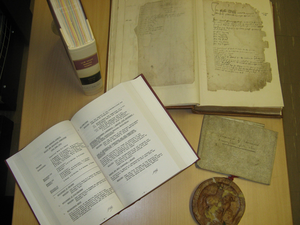We all create records. We need them to carry out our daily activities. Some of these records are particularly important, and we ensure that we keep them for as long as necessary. Some we decide to keep permanently, and these become our archives.
Organisations of all sorts create records in the same way; they keep most only for as long as necessary, but they keep certain ones permanently. These become the archives of the organisation.
In the same way, people and organisations in the past also created records, and kept the important ones: their archives.
Sometimes, people and organisations are less organised, and records may not be kept deliberately but may survive by accident. They may be found later by other people, who might decide that some or all of the records are worth keeping because of their historical importance.
All of these archives from the past, and the archives now being created, are the raw material of history. They tell us what people and organisations did, how and sometimes why they did it, and sometimes what they thought. By using archives we can connect directly to past generations.

Archives aren’t only old documents
Archives are often thought of as ’old documents’.
But they can be any age – yesterday’s committee minutes are part of the archive of the local council, as much as a medieval title deed which is part of the archive of a landed estate.
They can be in any form. They may be on parchment, or handwritten on paper, but they can be typewritten papers or files of documents, ring-binders or volumes; they may be photographs, maps, sound recordings, films, computer floppy disks, CDs, electronic databases, digital images ……

Archives – a formal definition
There are a number of formal definitions of archives, but this is a good summary:
Records are documents in any format which are created by an individual or organisation in the course of conducting their business. Records with long-term value and usefulness are selected for permanent preservation and become archives, acting as the corporate memory of institutions and businesses and, for some, a testament of individual experience.
Archives help to tell the story of our past and to preserve our collective memory and cultural identity.
Want to know more? See some examples of different types of archives.